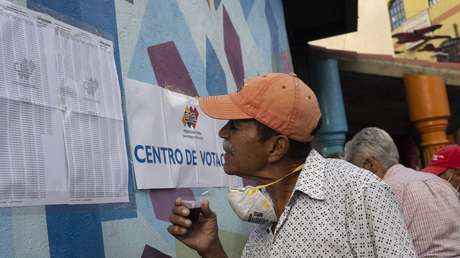Posted:
November 21, 2021 23:11 GMT
In a press conference before the end of the election day, a group of international observers highlighted the broad voter participation and the nature of the process.
As of 6:00 on Sunday afternoon, polling stations began to close in Venezuela after an election day that lasted more than 12 hours. According to the electoral regulations, after that time, in the event that there are no voters in the ranks of the polling stations, the polling stations are closed to start the stage of checking the results. Otherwise, the process will continue until there are no voters.
The National Electoral Council (CNE), via its Twitter account, ratified this information and announced that once the results are scrutinized, 54% of the voting tables will be verified by citizens, after a lottery is conducted in each center.
In this election, they are called to vote 21 million Venezuelans, which will elect 23 governors, 335 mayors, 253 state legislators, and 2,471 council members for a total of 3,082 positions. More than 70,200 candidates will run for this election.
For these elections, 14,262 polling stations were established with 30,206 polling stations across the country.
international observers
Minutes before polling stations closed, a group of international observers held a short press conference from the headquarters of the National Electoral Council (CNE, central Caracas).
Former Ecuadorean Foreign Minister Ricardo Patiño, one of the international comrades, said that during his tour of the polling stations he could observe “a lot of order and discipline in the matter of biosecurity” and “wide post Of the political parties of the government and those that are not.”
“We were able to note that in all cases there were at least three witnesses from different political parties” at the polling stations.
# Video📹 | International Fedor Ricardo Patiño confirmed that the massive and enthusiastic participation of the Venezuelan population was evident on this day. Likewise, he noted that achieving this participation strengthens and strengthens Venezuelan democracy.2021pic.twitter.com/lANTgvCJ0C
– VTV Channel 8 (@VTVcanal8) November 21, 2021
For her part, the former president of the Ecuadorean Assembly, Gabriela Rivadera, confirmed that the day has passed “very quietly”.
“We want to mention the entire previous process, because it is worth mentioning the agreements at the dialogue tables in Mexico,” he said, referring to the negotiation process between the government and the various sectors of the opposition, in which the opposition political parties participated. They called for a boycott of the previous elections because they considered them fraudulent and because they did not recognize Venezuelan institutions.

Similarly, Spanish politician Juan Carlos Monedero, who is also in the South American country, voiced these voices “It represents a turning point in the country“.
“We witnessed peaceful elections. We saw the meeting of witnesses from different parties at the table,” he said, referring to his tour of the polling stations. “With this election, the government and the opposition recognize each otherIt is a colossal result, which goes beyond what the polls say and represents a new normal in Venezuela,” according to Carlos Mondero.
About 300 international observers attended this election, including members of the Latin American Center for Electoral Experts (CEELA), the United Nations (UN), the Carter Center and the European Union (EU).
In this regard, Venezuelan President Nicolas Maduro wrote on his Twitter account that his country will “strengthen political dialogue, democratic governance and the ability to confront problems and find solutions.”
In Venezuela, what will emerge from now on will be good. Political dialogue, democratic governance and the ability to confront problems and achieve solutions will be strengthened. I have great faith and hopes for the coming years. pic.twitter.com/cmBjANDOOb
– Nicolas Maduro (@Nicolas Maduro) November 21, 2021
The President had announced a few days ago that he would invite, next Monday, the Federal Government Council to hold a joint working table meeting with the elected authorities.
“Dual power strategy”
Sociologist Franco Velma, a researcher at Mission Verdade, told RT that the South American country “perfectly managed to withstand sieges and external pressure,” which puts the country in an “ideal position to solve the internal problem.” issue and confront the international situation.
Vilma referred to the “dual power strategy” it tried to impose in Venezuela, with the support of the US government, after former Vice President Juan Guaido was declared “responsible president” in 2019. This series of actions to ignore led the entrenched authorities to keep the Venezuelan state’s assets abroad and return coercive measures in the country.
If you like it, share it with your friends!

“Unapologetic tv specialist. Hardcore zombie trailblazer. Infuriatingly humble problem solver.”
